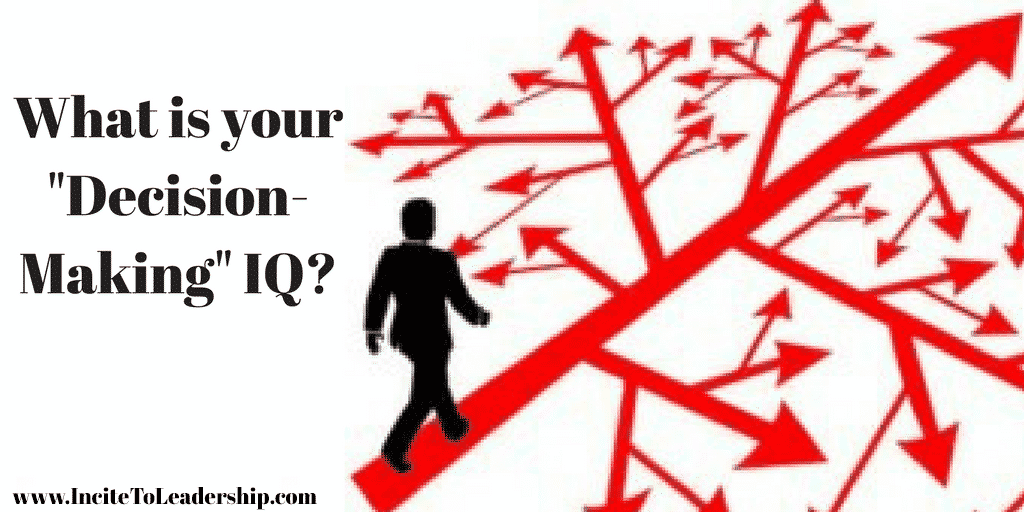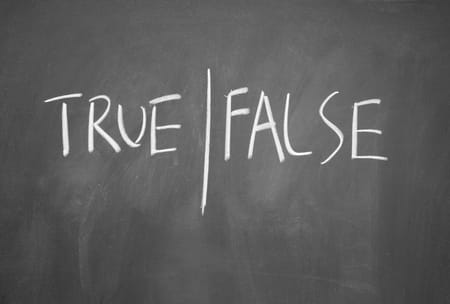What is your “Decision-Making” IQ?

When I was in graduate school, we had to figure out complicated economics problems where you were maximizing several variables at once. A complex way of saying – “there’s a lot of factors that go into any good decision.”
In today’s workplaces, not only are you likely to find yourself trying to make similarly complex decisions – often with missing information – but I’ll bet there are multiple stake-holders you have to consult as well before making many of these decisions. That means that even though you might have some fairly straightforward decisions to make, a huge chunk of your decisions are not so simple and require a lot of cognitive effort.
One of my clients is highly intelligent and rational. He weighs the pros and cons of many potential company strategies and arrives at a solution that makes sense. The only wrinkle is, in a company with multiple personalities weighing diverse priorities – the solution that’s obvious to him can sometimes frustrate or shut-down his peers and higher-ups.
 It turns out that in today’s workplace, decision-making takes on a whole new level of intricacy to properly deal with the challenges of uncertainty, different stake-holders, possible alternatives and unintended consequences.
It turns out that in today’s workplace, decision-making takes on a whole new level of intricacy to properly deal with the challenges of uncertainty, different stake-holders, possible alternatives and unintended consequences.
Because of the possibility of conflict and unwanted outcomes, making decisions can be stressful. Being aware of your strengths and weaknesses, and those of your team, helps alleviate that stress, and is a big step on the road to being a leader who can taking decisive and intelligent action and gather the support of those around him or her.
To determine whether your decision-making skills are as sharp as they could be, answer True or False to the following questions.
- Prior to making decisions I ensure that I have established clear objectives that identify the desired outcome.

- I’m not afraid to make crucial distinctions such as: “Is this decision efficient and effective?”
- When a group decision is required, I know where to find the appropriate stakeholders and how to approach them to ensure they are represented accurately.
- I make every effort to create a supportive environment in which debate, discussion and scrutiny of potential decisions can occur. My team and colleagues feel that their positions are well ‘heard-out.’
- The overall objective is to make the best decision for the situation; the goal isn’t to compete with colleagues or find the “perfect” answer. (This means I’m happy if the decision is reasonable – even if it wasn’t one I initially supported.)
- Built into my decision-making process is the awareness and acceptance that the unforeseen will occur, and I have taken that into account without unnecessarily holding up the process. (I even have several contingency plans for when something unforeseen inevitably occurs.)
- I think in terms of responding rather than reacting. I’m aware of my emotional-state when making decisions and take a breather if I’m feeling overly-pressured to decide.
- I’m aware of my bigger purpose and use that insight to determine if the decisions I make reflect that purpose. (I’m also honest with myself and seek help when there’s a potential conflict or grey area between personal advantage and organizational benefits.)
- When decisions lead to unexpected or undesired outcomes, instead of criticizing (myself and/or others), I ask, “What have I learned from this experience and how can I improve?” I’m often asking this question of my team as well.
- Before making a decision I ask, “Is this choice in alignment with my values? Is this me?”
- I make the distinction between decisions based on a “story” and those based on fact. I’m persistent in examining any gaps between my beliefs and others.
- When I make a decision based on a “gut feeling,” it comes not only from a feeling, but from my entire core of inner wisdom, experience and knowledge.
- I want my life filled with people, circumstances and objects that reflect the real me, and my decisions reflect that.
- I will revisit my initial “gut” instinct – until I’m sure why it “just feels right,” and if I still believe it.
- Not making a decision is a decision in itself, and sometimes the best course of action is taking no direct action at all.
- With every decision comes an element of risk. Although it can be difficult to consistently predict outcomes, I use intellect as well as emotion to mitigate that risk.
If you answered true to 10 or more statements, you are on the road to becoming wise and bold decision maker. If fewer, you may wish to explore your process of decision-making.
Share your number in the comments below!